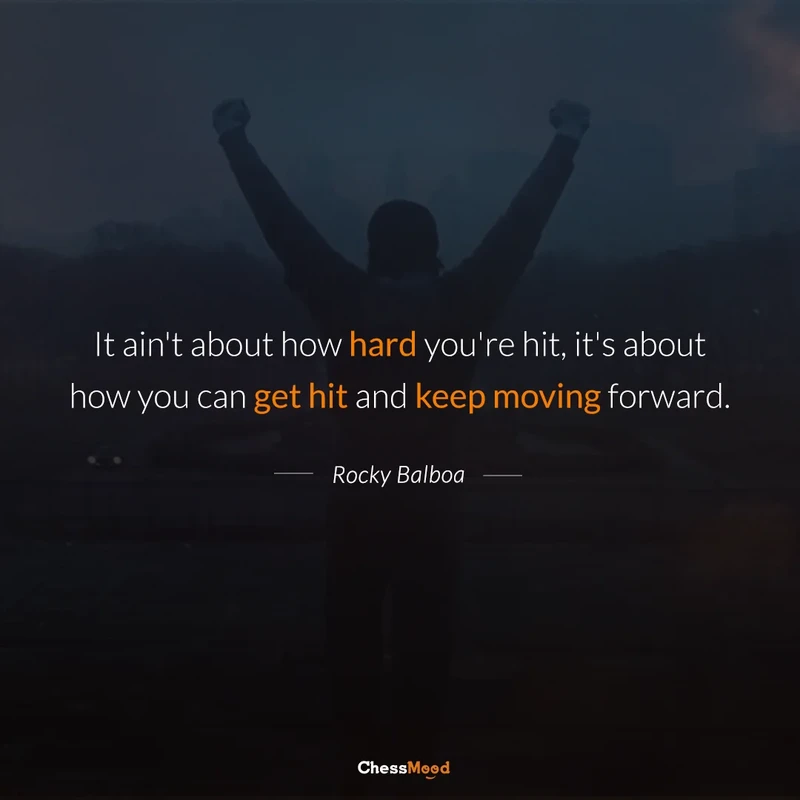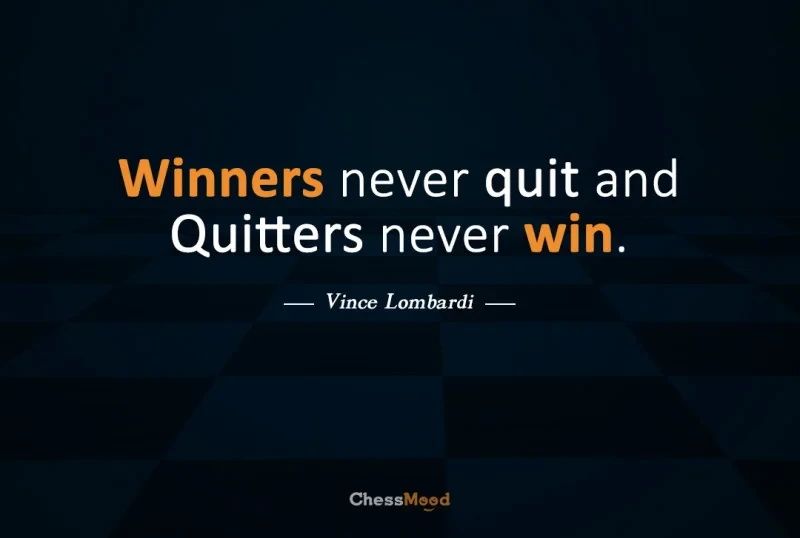
The 1 Thing Every Champion Has in Common
In your chess journey, you'll face painful losses. Everyone does. But in those moments, you have a choice — a choice that separates the champions from the rest.“In 1959, Floyd Patterson put his title on the line to fight Ingemar Johansson.
Although he trained hard for the fight, there was something missing in Patterson’s camp as the day approached.
Maybe it was hunger. Maybe it was commitment.
Patterson was bored. He was impatient. He was overconfident. And when he got in the ring, it showed. He was not the man who deserved to win.
‘Every fighter should be a little afraid of what could happen to him, because fear makes your mind sharper. When you have nothing to fear, your mind becomes dull.’ - Patterson reflected on the fight later.
But he didn’t think he could lose, and you could see he wasn’t sharp.
In the third round, he went down. Seven times. The fight was finally stopped.
The horrible words came to him as the fog from the punches cleared.
Patterson couldn’t believe it. But it was true. And more painfully still: It was all his fault.
Now, this could have been the end of the story. In fact, for all of boxing history up to that point and almost every title fight since it was.
Once a champion loses their belt, they never win it back. They’re done. They’re down. For the count.
Patterson spent weeks moping, kicking himself. The guilt made him sick. He could barely sleep or even look his children in the eye. He was knocked out.
Then a letter arrived from Archie Moore, the boxer who Patterson had himself beaten to get the title.
‘Dear Floyd,’ it said, ‘I know how you must feel. I hope you don’t continue to feel bad. The same thing has happened to many fighters. Of course, I hated to lose to you, and fate decreed it that way.’
Continuing, the letter broke down the fight and the obvious problems with Patterson’s strategy, before concluding, ‘If you concentrate your jab and move around this guy, you can be the first one to regain the crown.
You can do it. Your friend, Archie Moore.’
It’s worth taking a minute to recognize the incredible kindness as well as self-discipline it takes for a former champion to take the time to write, unsolicited, such encouragement to their archnemesis at their lowest moment. Moore could have taunted Patterson; instead he helped him believe in himself.
This moment of grace was exactly what Patterson, who was slipping into despair, so badly needed. His backslide was arrested. The pity party ended. He had been reminded of his agency — he could turn this into something.
Training camp resumed. He willed himself to watch the film of his ignominious defeat, learning from each tortuous viewing.
And then in June 1960, almost exactly a year later to the day, Floyd Patterson knocked out Ingemar Johansson midway through the fifth round. Floyd hit Johansson so hard the man took five minutes to regain consciousness in the middle of the ring.”
Thanks, Ryan
In my previous article “The Power of Fear and How to Use It as Motivation” I promised to share with you how Patterson got back up.
What you read above is the word-for-word copy and paste, from my favorite author Ryan Holiday’s book, “Discipline Is Destiny”.
I highly recommend reading this if you struggle with discipline.
THE CHAMPIONS
I had fallen down so many times, in different periods, doing different things.
During my professional career as a chess player, as a coach, as a poker player and as the founder of ChessMood.
At times I stayed down for days, for weeks and sometimes months. I felt very unlucky and blamed everything and everyone.
But somehow I always got back on my feet and continued.
I thought I’m THE CHAMPION and Rocky would be very proud of me.

But now that I’m reading biographies and watching documentaries, now that I interview high achievers, I see that everyone was once there.
And I see many cases where they have been beaten more badly and stood up more quickly than me.
I now realize that while some of those CHAMPIONS had more talent and resources than others, some worked harder than others, and some were luckier than others, they all had one thing in common.
They all had fallen down and they all got back on their feet.
Winners Never Quit
Ryan puts it nicely:
“We’re all going to mess up. We’ll fall off our diet or our sobriety. We’ll lose our temper and embarrass ourselves. We’ll make mistakes. We’ll be beaten.
But will that be the end of it? Is that who we are now? Or can we get back up?
Losing is not always up to us... but being a loser is.
Throwing in the towel on a fight we’ve clearly lost is one thing, throwing in the towel on fighting, on your standards, from that point forward?
Now you’ve been more than beaten, you’ve been defeated.”

Be in the minority
You’re not alone if you've blown up a winning position.
You’re not alone if you’ve blundered a Rook in the last round, on board 1.
You’re not alone if you’ve finished last in the tournament.
You’re not alone if you’ve lost ten games in a row.
You’re not alone if you thought about quitting.
But you’ll be in the 1% minority, if you get back on your feet after each time you fall.
Japanese Proverb says:
“Fall down seven times, get up eight.”
Now, I’m not sure how many times on average CHAMPIONS fall. But they get up. Sometimes they take some rest. Sometimes they wander. Sometimes they feel lost. But they get up.
Be a CHAMPION.
Fall, but get up.
With best wishes and love,
For your growth and fun journey,
GM Avetik (or Avo, as my friends call me)
***
Originally Published
P.S
The article was originally published on https://chessmood.com/blog, where you’ll find over 100 other articles written by Grandmasters, who share tips from their professional journeys and how to adopt the right mindset for this beautiful game, in order to have fun and grow at the same time.
------------------------------------------------------------------------------------------------------------------------------------
P.P.S. If you’re not a ChessMood student yet, I have three gifts for you:
- Opening Principles- The fundamentals and beyond in detail
- My 10 best games
- GM Gabuzyan’s 10 best games

You can watch all three courses for free, by creating a basic account here. (Takes a few seconds)
You may also like
 GM Avetik_ChessMood
GM Avetik_ChessMoodThe Magic of Doing the Right Thing
Do This... and Watch the Magic Happen GM Avetik_ChessMood
GM Avetik_ChessMoodThe Biggest Roadblock to Chess Improvement
What keeps you growing isn’t what you know. It’s the “I don’t knows” you carry. A lesson from Metall… GM NoelStuder
GM NoelStuder99% Make This Game Analysis Mistake
Most chess player's game analysis, if they do it at all, looks somewhat like this: GM Avetik_ChessMood
GM Avetik_ChessMood5 Boosters to Speed Up Your Chess Growth
Discover the 5 boosters that can enhance your chess skills and find out the one thing that is absolu… GM Avetik_ChessMood
GM Avetik_ChessMoodThe Only Rating That Really Matters
You know your chess rating. But do you know the one that actually matters? It’s not on Lichess. It’s… GM Avetik_ChessMood
GM Avetik_ChessMood